Saudi Arabia’s execution of two Bahrainis sparks competing hashtags on Twitter
Arabic hashtag condemning the execution significantly more popular than hashtag supporting the execution
Saudi Arabia’s execution of two Bahrainis sparks competing hashtags on Twitter
Share this story
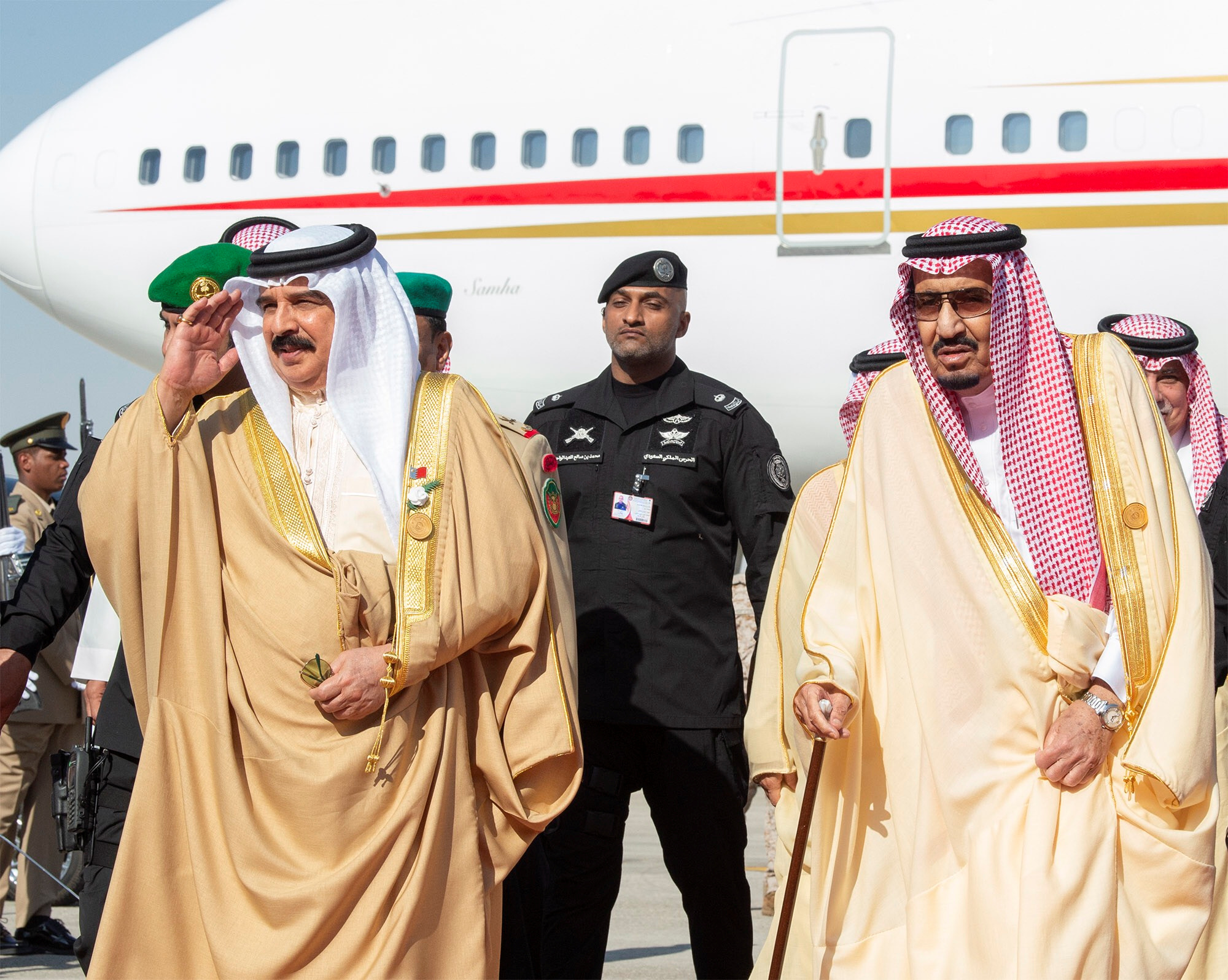
BANNER: Saudi Arabia’s King Salman receives Bahrain’s King Hamad ahead of the 2018 Gulf Cooperation Council Summit in Riyadh. (Source: Bandar Algaloud/Courtesy of Saudi Royal Court via Reuters)
On May 29, 2023, Saudi Arabia executed two Shia Bahraini men, Jaafar Sultan and Sadiq Thamer, on terrorism-related charges. The following day, a protest took place in Manama, Bahrain’s capital, condemning the execution. Arabic social media users in Saudi Arabia and Bahrain received the news with mixed reactions, some condemned the execution while others supported it. The DFRLab identified two competing hashtags used by social media users posting about the execution on Twitter, #البحرين_مفجوعة (“Bahrain is in grieving”) and #البحرين_في_غاية_السعادة (“Bahrain is very happy”). An examination of the hashtags using the social media analysis tool Meltwater Explore revealed that the hashtag condemning the execution was significantly more popular than the hashtag supporting the execution.
In a statement posted on Twitter, the Saudi Ministry of Interior (MOI) said the two Bahrainis smuggled explosives to Saudi Arabia and joined a terrorist cell aiming to destabilize security and create chaos in Saudi Arabia and Bahrain. The announcement did not provide any details about which terrorist groups Sultan and Thamer allegedly belonged to. At the time of writing, the post had been retweeted 2,145 times and viewed 2.3 million times. Most commenters on the tweet expressed wishes for security and support for Saudi authorities.

Several of the commenters who responded to the Saudi MOI’s tweet by condemning the execution were attacked by other Twitter users expressing support for the execution; this was the case with Bahraini human rights defender Yahya Alhadid. Some accounts wished Alhadid the same fate as Sultan and Thamer.

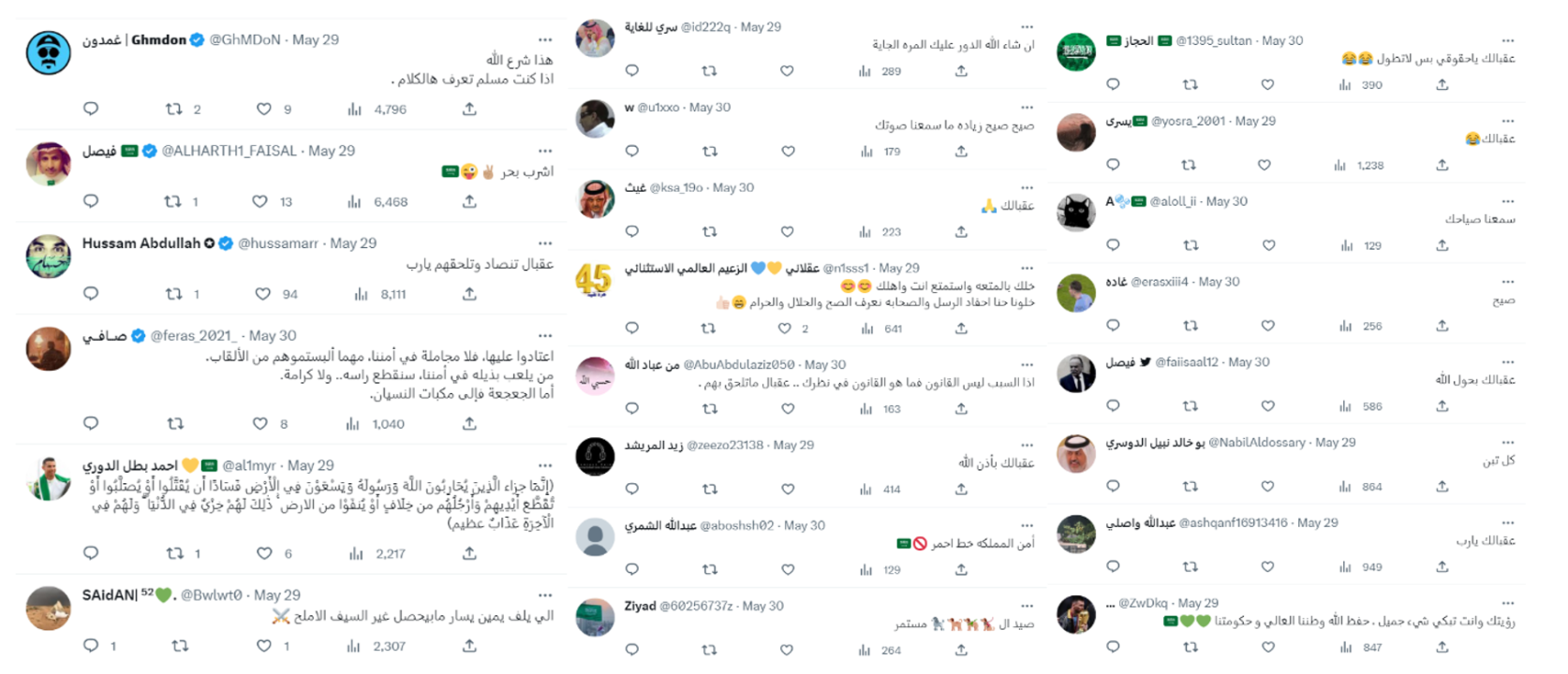
Twitter users that condemned the execution or shared footage from the protest in Manama used the hashtag #البحرين_مفجوعة (“Bahrain is grieving”). Other users, including prominent Bahraini human rights activist Maryam Alkhawaja, posted footage of Sultan and Thamer’s fathers embracing each other and mourning their sons while standing by symbolic graves. Sultan and Thamer’s bodies remain held in Saudi Arabia.

Twitter users posting in support of the decision to execute Sultan and Thamer used the hashtag #البحرين_في_غاية_السعادة (“Bahrain is very happy”) to post tweets celebrating the execution. Accounts in support of the execution also attempted to dismiss the anti-execution hashtag. For example, @walSeddeqi tweeted that Bahrain “is neither sad nor grieving. On the contrary, it is very happy and joyful” the execution took place. Other users, like @Plixs9, @ahm3d_ib, and @i_rashed0, used both hashtags in tweets praising Saudi Arabia and its rulers, making their content visible to users searching for and engaging in the conversation taking place under the anti-execution hashtag.
The account @Plixs9 tweeted a manipulated photo of the Saudi and Bahraini monarchs holding swords with photos of Sultan and Thamer’s faces edited onto the swords. The original photo was taken in 2016 during a visit by King Salman bin Abdulaziz to Bahrain. Other users who tweeted their support for the execution shared the picture but cropped Bahraini King Hamad bin Isa Al Khalifa out of the image.
Additionally, a photo of a cake featuring the message “Congratulations on the execution,” was tweeted by several accounts, including @ALHARTH1_FAISAL, who tweeted in Arabic, “Congratulations on the destruction of the terrorists.” The picture of the cake was originally tweeted by another user, but the tweet appears to have been deleted as it no longer appears on the user’s timeline. However, a copy of the tweet was posted by a user who expressed that “gloating over a dead person is a vile trait.”
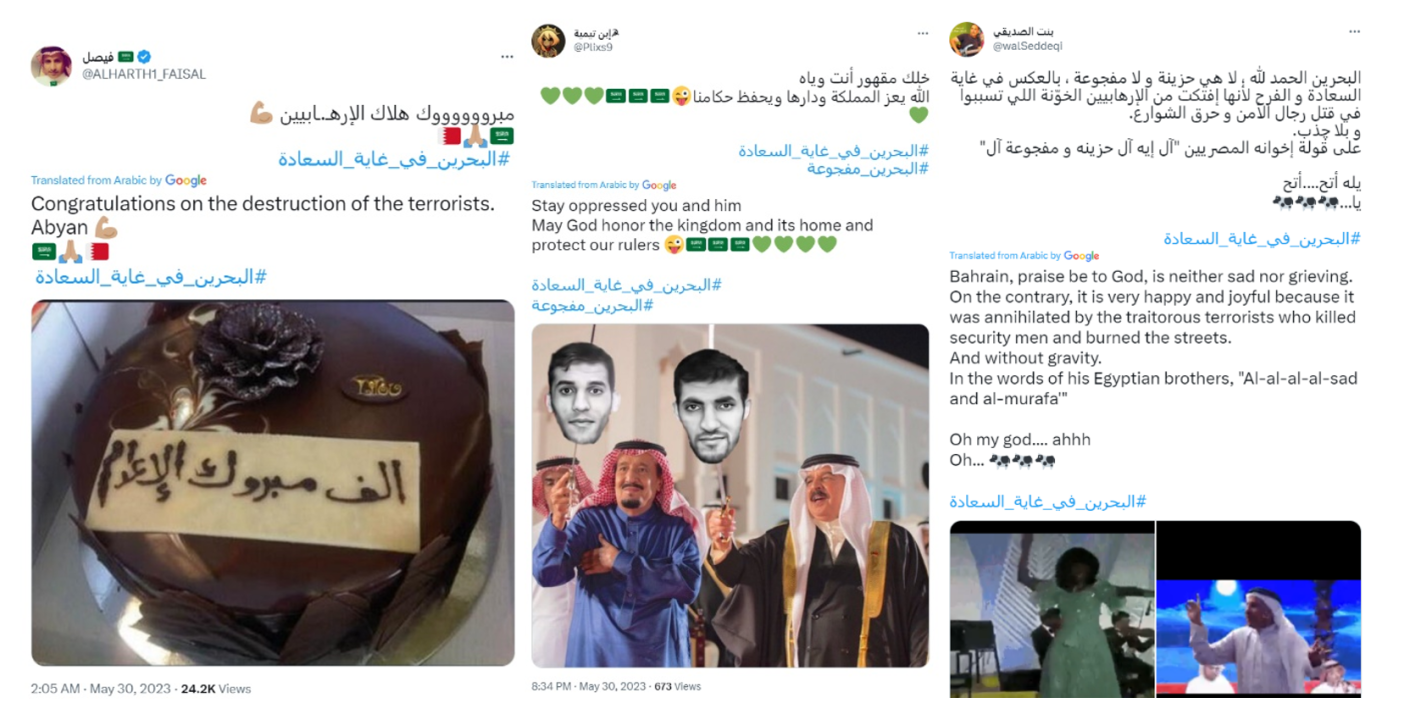
Data collected from Meltwater Explore on the use of the two hashtags between May 29 and June 12 reflected that the hashtag #البحرين_مفجوعة (“Bahrain is in grieving”) received significantly higher traction and reached a wider audience than the hashtag #البحرين_في_غاية_السعادة (“Bahrain is very happy”). The anti-execution hashtag received 64,391 mentions by 16,150 users in 6,099 original tweets, 51,563 retweets, and 5,638 quoted tweets. Meanwhile, the pro-execution hashtag was used by 802 users, receiving 1,041 mentions and eighty-four original tweets that were retweeted 751 times and quote-tweeted 118 times.
The majority of tweets mentioning either hashtag were authored by accounts in Saudi Arabia, followed by Bahrain. While both hashtags’ popularity on Twitter declined after the first week of June, the anti-execution hashtag was mentioned 2,480 between June 5 and 11. In contrast, the pro-execution hashtag was used only twice during the same period.
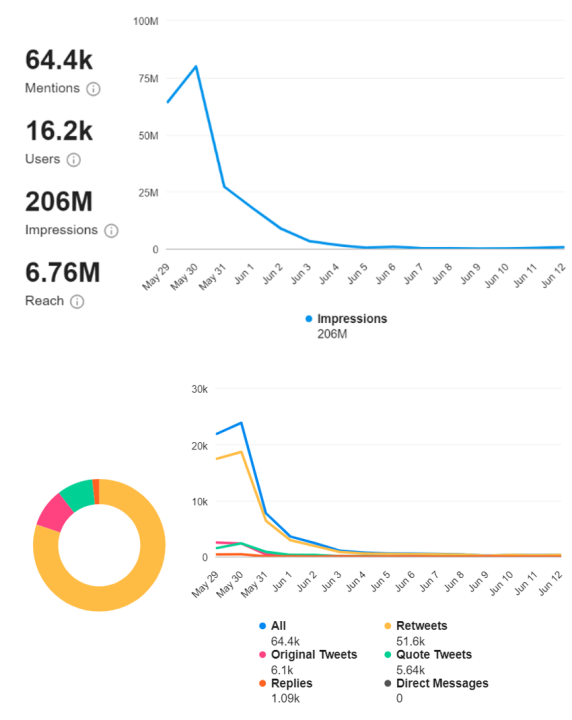
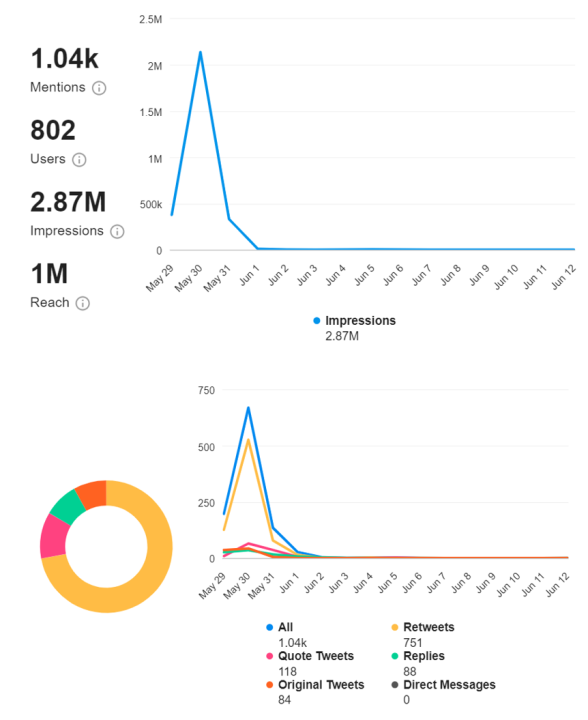
Condemnation from rights groups
Sultan and Thamer were detained in Saudi Arabia in 2015 and sentenced in October 2021. Amnesty International called the trial “deeply flawed” and “grossly unfair.” Their conviction and death sentence were upheld by the Appeals Court on January 11, 2022, and by the Supreme Court on April 6, 2022. Saudi Arabia moved forward with Sultan and Thamer’s execution on May 29, 2023, despite condemnation from rights groups. The organization Americans for Democracy and Human Rights in Bahrain (ADHRB) led a social media campaign using the hashtag #EndTheDeathSentence calling on Saudi Arabia to commute the death sentences and return Sultan and Thamer to Bahrain. ADHRB condemned Sultan and Thamer’s execution, as well the use of confessions reportedly extracted from them under duress. ADHRB noted that Sultan and Thamer were previously tried in Bahrain and sentenced to life imprisonment, then transferred to Saudi Arabia and tried again, leading to their death sentence.
As executions in Saudi Arabia must be ratified by the king, Amnesty International appealed to King Salman in a letter dated May 23, 2022, urging the king not to ratify the death sentence ruling. Amnesty International’s letter said that Sultan and Thamer were initially detained for more than 115 days, during which they were denied contact with their families and reportedly mistreated to extract their confessions.
Two United Nations special rapporteurs and the vice-chair of the Working Group on Arbitrary Detention penned a letter asking the Saudi government to “halt any possible step towards the execution of Mr. Sultan and Mr. Thamer.” The letter also called on the government to annul the death sentence convection, allow for a retrial, and investigate allegations of torture and mistreatment against Sultan and Thamer.
Following Sultan and Thamer’s execution, ADHRB published a detailed account of the series of events that led to their execution, including their mistreatment, threats, and lack of access to legal resources and a fair trial. Authorities in Bahrain, a Shia-majority country ruled by Sunni leaders, did not react to the news.
Saudi Arabia’s record of executions
The execution of Sultan and Thamer’s have shed additional light on Saudi Arabia’s prolific use of the death penalty; the country has the highest rate of executions in the region. The European Saudi Organization for Human Rights (ESOHR) estimates there have been more than 1,000 executions since King Salman came to power in 2015. ESOHR blamed an uptick in human rights violations in 2022 on the rise of Crown Prince Mohammed bin Salman, known as MBS.
One week before Sultan and Thamer’s execution on May 29, Saudi Arabia executed four men from the country’s eastern Al Qatif governorate, who were also convicted on terrorism-related charges with confessions reportedly extracted through torture.
The UN also expressed alarm on May 3 about the “imminent risk of execution” of three men from the Huwaitat tribe, sentenced to death after also being convicted on terrorism charges. The Saudi human rights organization ALQST reported that the charges are “in relation to their peaceful opposition to forced evictions and residents’ displacement for the state-led Neom megacity project.”
In May, ALQST called on Saudi authorities to investigate alleged rights violations in the trials of nine young men facing possible execution for crimes allegedly committed when they were minors. One of the men was charged with murder and robbery, and the remaining eight face charges under Saudi Arabia’s counterterrorism law, which includes vague provisions used by the Saudi authorities to target and harass individuals and limit their rights to assembly and free speech. According to ALQST, “The courts’ rulings have followed grossly unfair trials that failed to meet basic standards of due process, including by denying legal counsel and access to criminal files, and admitting coerced confessions as evidence in court.”
ALQST called on the Saudi authorities “to establish a moratorium on use of the death penalty with the aim of working towards its abolition.” An Amnesty International report on global executions and death sentences estimates that the recorded number of Saudi Arabia’s executions has tripled from sixty-five in 2021 to 196 in 2022, eighty-one of which occurred in one day over various offenses. More than forty people have been executed in Saudi Arabia in 2023.
Cite this case study:
Dina Sadek, “Saudi Arabia’s execution of two Bahrainis sparks competing hashtags on Twitter,” Digital Forensic Research Lab (DFRLab), July 5, 2023, https://dfrlab.org/2023/07/05/saudi-arabias-execution-of-two-bahrainis-sparks-competing-hashtags-on-twitter.

